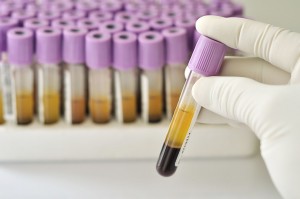Increased levels of branched-chain amino acids may be early sign of pancreatic cancer
 Researchers in the USA have discovered that increased levels of branched -chain amino acids in the blood could be an early sign of pancreatic cancer. Following on from previous studies in mice, the scientists who have published this study in Nature Medicine ((Mayers et al., (2014) Elevation of circulating branched-chain amino acids is an early event in human pancreatic adenocarcinoma development, Nature Medicine doi:10.1038/nm.3686 available online http://www.nature.com/nm/journal/vaop/ncurrent/full/nm.3686.html#affil-auth )) have found that, in a study using blood samples from over 1500 people involved in previous health studies, those who developed pancreatic cancer had higher blood levels of branched-chain amino acids (BCAAs) – essential nutrients that the body extracts from proteins found in foods – compared with participants who did not develop pancreatic cancer.
Researchers in the USA have discovered that increased levels of branched -chain amino acids in the blood could be an early sign of pancreatic cancer. Following on from previous studies in mice, the scientists who have published this study in Nature Medicine ((Mayers et al., (2014) Elevation of circulating branched-chain amino acids is an early event in human pancreatic adenocarcinoma development, Nature Medicine doi:10.1038/nm.3686 available online http://www.nature.com/nm/journal/vaop/ncurrent/full/nm.3686.html#affil-auth )) have found that, in a study using blood samples from over 1500 people involved in previous health studies, those who developed pancreatic cancer had higher blood levels of branched-chain amino acids (BCAAs) – essential nutrients that the body extracts from proteins found in foods – compared with participants who did not develop pancreatic cancer.
The researchers found that elevated plasma levels of branched-chain amino acids (BCAAs) are associated with a greater than twofold increased risk of future pancreatic cancer diagnosis. This elevated risk was independent of known predisposing factors, with the strongest association observed among subjects with samples collected 2 to 5 years before diagnosis.
Further investigation revealed that a breakdown in muscle tissue is responsible for the increase in BCAAs, as the process releases more of them into the bloodstream and this suggests that increased whole-body protein breakdown is an early event in development of pancreatic cancer.
While early days, this study will help in the development of ways to detect pancreatic cancer at its earlier stages.